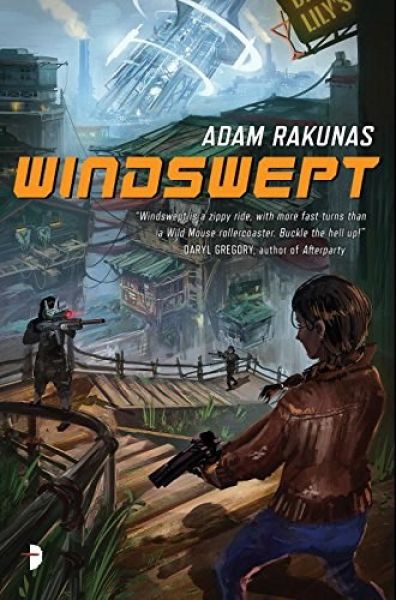Laid the Wide Foundations
Windswept (Windswept, volume 1)
By Adam Rakunas

4 Aug, 2016
0 comments
Adam Rakunas’ 2015 Windswept is the first volume of his Windswept series. Me being me, I read the second book, Like a Boss , first. Whoops. But I am nothing if not a completist.
Padma Mehta is experienced enough to know not to trust any deal offered by professional scam artist Vytai Bloombeck, especially one as too good to be true as this: forty potential Breaches, defectors from the exploitative labour contracts of the Big Three that run most of Occupied Space. But Padma is desperate to retire to the life of a distillery owner and all that stands between her and that goal is her recruitment quota. Desperation overwhelms prudence.
Always listen to that little voice that says “too good to be true.”
There aren’t forty breaches in the commandeered cargo drop cans. There are just six, and one of them is dead. Five recruits and a corpse won’t get Padma to her goal. Still, six recruits are better than no recruits. There will be time later to chat to Bloombeck about the vast gulf between what he promised and what he delivered.…
Or so Padma thinks.
Unfortunately for Windswept, it has unknowingly lost the protective shelter of being too small to concern the Big Three. While Padma has been focused on union business (also on earning enough to become a distillery owner), others have pursued a more megalomaniacal strategy, one that makes Windswept a legitimate threat to Occupied Space. More importantly, to the Big Three who own most of the human worlds.
To the Big Three who would rather burn a planet clean of life than have their economies wrecked.
~oOo~
I was distracted by the fact that the interstellar economy seems to run on molasses. It’s being used as a means to store energy. It’s true that sugarcane photosynthesis is comparatively efficient (13% if I recall correctly) and to date sunlight is unmetered, but ethanol seems like a better cane-derived fuel choice [1]. Not quite sure why the author preferred molasses. I am not saying he didn’t have a good reason, but I don’t know what it was.
Windswept has background details that the later Like a Boss lacked (no doubt because the author reasonably expected everyone to have read the first book first), details that put the rather grandiose scheme of Like a Boss ‘s antagonist into context. The Big Three (or at least their poorly supervised field teams) are willing to rack up significant body counts protecting the bottom line. Of course it makes sense that anyone raised in Occupied Space would have a high threshold for allowable collateral damage.
One detail not included in Like a Boss (or perhaps one that I missed) is that Windswept is not the only hold-out world, not the only place free(ish) of the Big Three. That makes the setting slightly less dystopian. But only slightly. One of the things I noticed when I took my latest run at the Tiptree winners [2] was that a generation ago authors could imagine worlds that were not crushed under the boot of cruel mega-corporations. Now the closest to utopia we seem to be able to imagine is that some places might be too poor to be worth the bother of crushing. I suppose this setting is shaped by the author’s inspiration, Hawai‘i.
Padma has that ideal mix of greed-driven short-sightedness and panic-driven competence that justifies an action-oriented plot. It takes her quite a while to piece together what’s going on … although in her defense, the other side’s bold plan is not one any reasonable person would ever consider. By the time she does get all the clues and puts them together, it’s nearly too late. Just the recipe for the spectacular finale toward which the novel builds.
I preferred Like a Boss to Windswept, but I definitely enjoyed both. I just read them in the wrong order: the sequel is better than the original and isn’t that a good thing. Learn from my fail!
1: This is a placeholder for the long and rambling discussion of synthetic and bio-fuels from which you have been spared. Truly, my self-control is legendary.
2: I will get back to that project.
